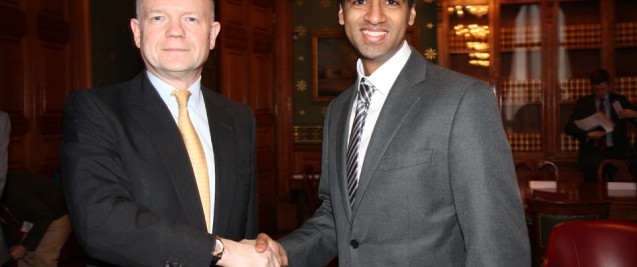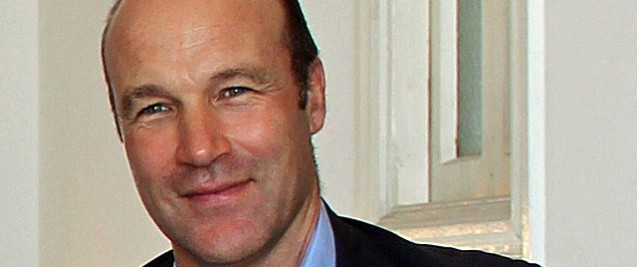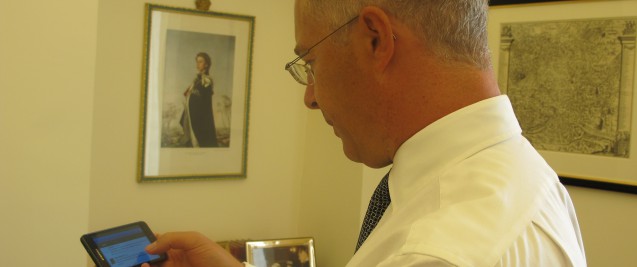28th March 2014
London, UK

This week the Foreign Secretary William Hague welcomed student Gopal Rao to the Foreign Office. The meeting was the result of a competition launched by the Foreign Secretary earlier in the year to thank his 200,000 Twitter followers for their comments, engagement and ideas. The prize – a meeting with him and the chance to […]
Read more on Marking the Foreign Secretary’s 200,000 twitter follower | Reply
21st March 2014
This post was published when the author was in a previous role
Modern diplomats, and modern Popes, are in the communications business. It remains right that there are still some government activities that are conducted behind the scenes, in confidence, with discretion, without fanfare. But modern diplomats must also persuade, which means delivering a convincing message, sometimes to the broadest possible audience, including on twitter and other […]
Read more on Twiplomacy and the Communicator Pope | Reply (3)
17th March 2014
Havana, Cuba

A lot of my diplomatic counterparts in Havana look completely bemused when I talk to them about Twitter or tell them what my last blog was about. That’s not because they don’t know what Twitter or blogging is but because they don’t really see social media as playing a role in their daily diplomacy. Many […]
Read more on Why on earth would an Ambassador in Cuba tweet? | Reply
14th March 2014
Havana, Cuba
A lot of my diplomatic counterparts in Havana look completely bemused when I talk to them about Twitter or tell them what my last blog was about. That’s not because they don’t know what Twitter or blogging is but because they don’t really see social media as playing a role in their daily diplomacy. Many […]
Read more on Why on earth would an Ambassador in Cuba tweet? | Reply (2)
10th January 2014
Toronto, Canada
Trouble reading this story or moving through pages? Check it out on Storify here: http://storify.com/SINCanada/global-sin-conference-2013 [View the story “Global SIN Conference 2013” on Storify]
Read more on Global SIN Conference 2013: A summary from Twitter | Reply
19th December 2013
Washington DC, USA
In my lifetime, the rise of digital communications has changed nearly every aspect of our daily activities. And in foreign policy, the world is changing as a result of digital’s ability to give a voice to so many. We have seen social media play a huge role in regime change in the Arab world, we have […]
Read more on Making all voices count online and “IRL” | Reply
29th November 2013
Beirut, Lebanon
French diplomat Jules Cambon saw the dangers of diplomatic openness in 1931, complaining that ‘the activities of the press, and ignorance of a public that insists on being told everything, do not create an atmosphere favourable to prosecution of political designs’. He was right, long before Assange and Snowden, that the media would sweep away […]
Read more on Waves, Arguments and Cliffhangers: Ten Ways Diplomats Can Communicate Better | Reply (1)
21st November 2013
London, UK

During a crisis Twitter has proved essential for the dissemination of critical information. Building on this reputation Twitter launched a new service called Twitter Alerts in the US, Korea and Japan in September 2013. Twitters have now released the service in the UK and the Foreign Office has signed up to take part. The service […]
Read more on Foreign Office Twitter Alerts: Supporting British nationals in a crisis | Reply
26th September 2013
London, UK
Sexual violence is used in conflict as a way to humiliate and destroy communities. A culture of impunity means that millions of women, children and men who have survived sexual attacks in war rarely see any form of justice, and perpetrators are able to commit these horrific crimes without fear of any consequences. To address […]
Read more on Thunderclap: Now is the #TimeToAct | Reply
19th September 2013
This post was published when the author was in a previous role

I recently ran a competition on Twitter, inviting questions about the Holy See and the UK’s relationship with it. The response was impressive, with many searching questions. Below are the winners, their questions, and slightly lengthier answers than the 140 characters Twitter permits. Q. What made possible the great shift from historical anti-Catholicism to dialogue […]
Read more on Questions about the Holy See | Reply (1)



